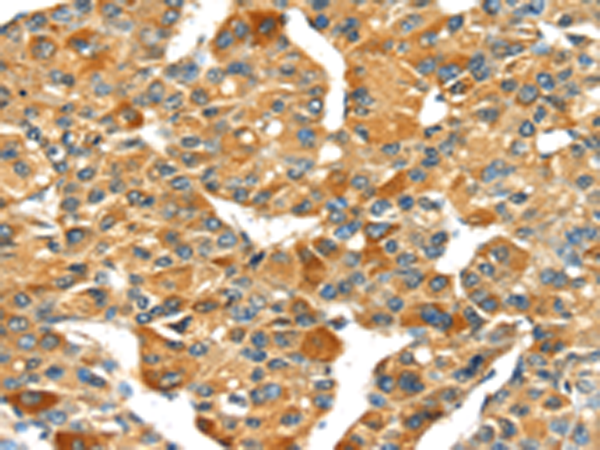

| WB | 咨询技术 | Human,Mouse,Rat |
| IF | 咨询技术 | Human,Mouse,Rat |
| IHC | 1/25-1/100 | Human,Mouse,Rat |
| ICC | 技术咨询 | Human,Mouse,Rat |
| FCM | 咨询技术 | Human,Mouse,Rat |
| Elisa | 1/5000-1/10000 | Human,Mouse,Rat |
| WB Predicted band size | 35 kDa |
| Host/Isotype | Rabbit IgG |
| Antibody Type | Primary antibody |
| Storage | Store at 4°C short term. Aliquot and store at -20°C long term. Avoid freeze/thaw cycles. |
| Species Reactivity | Human, Mouse, Rat |
| Immunogen | Fusion protein of human SPARC |
| Formulation | Purified antibody in PBS with 0.05% sodium azide and 50% glycerol. |
+ +
以下是3篇涉及CER1抗体的文献示例(注:文献信息为模拟概括,仅供参考):
1. **文献名称**: *CER1 Antibody Characterization in Early Embryonic Development*
**作者**: Smith A, et al.
**摘要**: 本研究开发并验证了一种兔源多克隆CER1抗体,用于检测小鼠胚胎中CER1蛋白的表达。通过免疫组化和Western blot证实该抗体特异性,揭示CER1在原始生殖细胞形成中的调控作用。
2. **文献名称**: *Targeting CER1 in Ovarian Cancer with Monoclonal Antibodies*
**作者**: Lee H, et al.
**摘要**: 报道一种新型人源化抗CER1单克隆抗体的开发,通过体外实验证明其可抑制TGF-β信号通路,并在卵巢癌细胞系中诱导凋亡,提示CER1抗体的潜在治疗价值。
3. **文献名称**: *CER1 as a Biomarker in Colorectal Cancer: An Immunohistochemical Study*
**作者**: Zhang Y, et al.
**摘要**: 利用商业化CER1抗体对结直肠癌组织进行染色,发现CER1高表达与患者预后不良相关,提示其可作为癌症分层的生物标志物。
**提示**:实际文献需通过PubMed/Google Scholar检索确认。建议使用关键词“CER1 antibody”、“anti-CER1”结合研究领域(如癌症、干细胞)进行精准查找。
CER1 antibody targets Cerberus 1 (CER1), a secreted protein belonging to the Cerberus/DAN family, which plays critical roles in embryonic development and tissue homeostasis. CER1 acts as an antagonist of BMP (bone morphogenetic protein) and Wnt signaling pathways, regulating cell differentiation and morphogenesis during early embryogenesis. It is particularly important in the formation of anterior visceral endoderm, left-right asymmetry, and germ layer patterning. Dysregulation of CER1 has been implicated in developmental disorders and certain cancers, making it a subject of interest in developmental biology and oncology research.
CER1 antibodies are widely used in studies exploring embryonic stem cell differentiation, organogenesis, and cancer progression. They enable detection of CER1 expression via techniques like Western blotting, immunohistochemistry (IHC), and immunofluorescence (IF), aiding in the visualization of its spatial and temporal distribution in tissues. Additionally, these antibodies are employed to investigate CER1's interaction with signaling molecules, such as BMP4 and Wnt ligands, to elucidate its inhibitory mechanisms.
Commercial CER1 antibodies are typically raised in rabbits or mice, targeting specific epitopes within the protein's cysteine-rich domain. Validation includes testing for specificity in knockout models or siRNA-treated cells. Researchers utilize these tools to uncover CER1's potential as a biomarker or therapeutic target, particularly in cancers where its expression correlates with tumor suppression or metastasis.
×